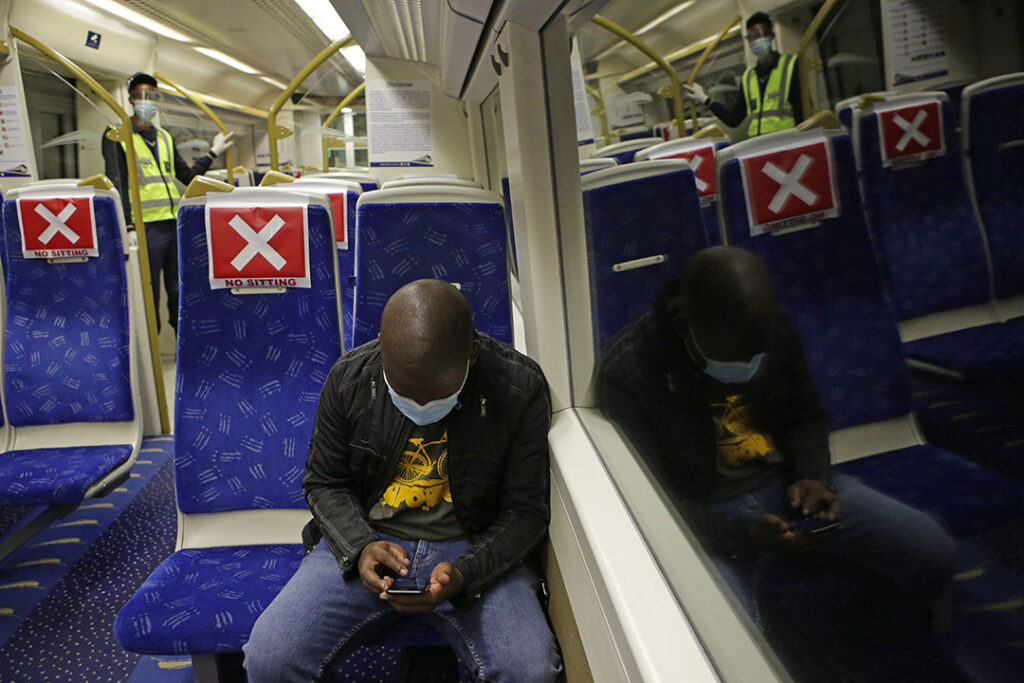ADF STAFF
In the fight against COVID-19, the movements of an infected person and the people he or she meets are vital pieces of information. As African nations wrestle with how to tamp down the spread of the disease, they’re turning to an important but unseen tool: smartphone data.
Smartphones have become tools in the fight against COVID-19 because owners take them everywhere and, through the cellular and GPS networks, they report their location constantly.
Across the continent, tech-savvy citizens are developing apps that can use phones to trace the movements of people to alert themselves and their neighbors to potential infection if they or someone near them has tested positive for COVID-19.
In Ethiopia, for example, young innovators have developed Debo, an app that uses phones’ Bluetooth signals to alert users that people with positive COVID-19 tests are or have been nearby recently. South Africa collects and stores mobile phone data under a program overseen by a Constitutional Court judge. Early in the pandemic, Kenya forced anyone arriving at its international airport into quarantine for 14 days and used their phones to monitor their location.
For some, the process of tracing people’s whereabouts and storing that data raises privacy concerns. At the same time, the 2014-2016 Ebola outbreak in West Africa showed the limitations of smartphone data, particularly when people have multiple phones and loan them to other people.
Privacy advocates warn that collecting and analyzing such specific data opens countries up to the risk of invading their citizens’ privacy.
“In principle, it’s a good idea — an alternative to economically damaging lockdowns,” Jane Duncan, former head of South Africa’s Freedom of Expression Institute, told Africa Portal. “But there are big dangers in digital contact tracing that need to be mitigated against.”
The African Union has embraced the use of data to monitor movements and pinpoint potential hot spots as it tries to stem the spread of COVID-19, which had infected more than 1 million people across the continent as of early August.
Backed by a variety of transnational organizations, including the African Tourism Board and the African Economic Zones Organization, the AU recently launched PanaBIOS, an app that can track crowds and spot potential COVID-19 outbreaks. Widespread use of the technology can help countries lift the border restrictions that have strangled their economies by allowing the movement of uninfected people.
AU Commissioner for Trade and Industry Albert Muchanga told African Integration Week participants at the end of June that the technology could be key to keeping the continental economy and the African Continental Free Trade Agreement moving after the virus outbreak stalled both.
Smartphones have become a tool to supplement face-to-face contact tracing. Technology-based contact monitoring can control community interactions, particularly around public Wi-Fi spots, data scientist Timothy Oriedo, founder of Kenya’s Predictive Analytics Lab, told The East African.
“Telling them there is an infected person in their amidst could inspire social change,” Oriedo said.
Ghana pioneered the use of PanaBIOS when its electoral commission used the software to reduce crowds by letting users schedule their visit at certain polling places.
The Africa Centres for Disease Control and Prevention and Africa Risk Capacity put “big data” to work recently with tools that let countries simulate the spread of COVID-19 and predict the potential outcome of different scenarios. The tools will help leaders make decisions and mitigate risks when it comes to things like reopening their borders.
“COVID-19 has generated unprecedented socioeconomic consequences with the reversal of hard-won development achievements,” said Mohamed Beavogui, director-general of African Risk Capacity, while announcing the new modeling tools. “Africa is particularly challenged in its efforts to cope with the disease burden.”

